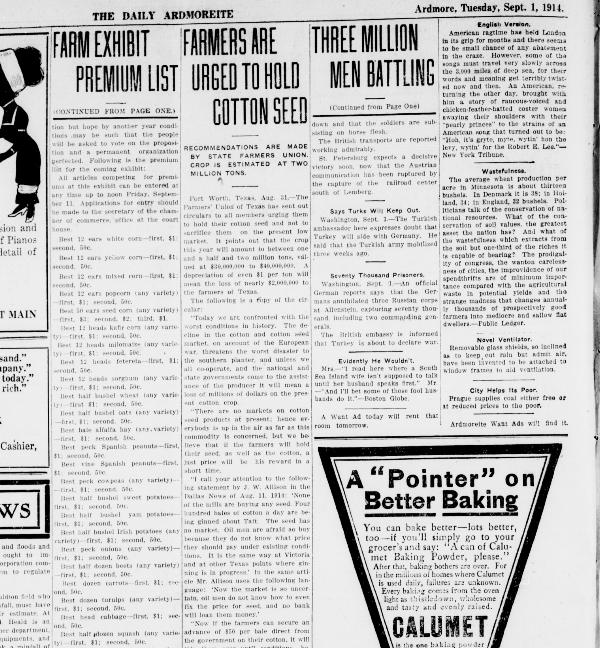|
Moderated by NW Okie! |
Volume 16 , Issue 292014Weekly eZine: (374 subscribers)Subscribe | Unsubscribe Using Desktop... |
September 1914, Farmers Urged To Hold Cotton Seed

The Daily Ardmoreite, Tuesday, September 1, 1914, reported on page eight that farmers were urged to hold cotton seed. Recommendations were made by state farmers union. The crop was estimated at two million tons.
Fort Worth, Texas, Aug. 31 (1914) -- The Farmers' Union of Texas had sent out circulars to all members urging them to hold their cotton seed and not to sacrifice them on the present low market. It pointed out that the crop that year would amount to between one and a half and two million tons, valued at $30,000,000 to $40,000,000. A depreciation of even $1 per ton will mean the loss of nearly $2,000,000 to the farmers of Texas.
Copy of Circular:
Today we are confronted with the worst conditions in history. The decline in the cotton and cotton seed market, on account of the European war, threatens the worst disaster to the southern planter, and unless we all co-operate, and the national and state governments come to the assistance of the producer it will mean a loss of millions of dollars on the present cotton crop.
There are no markets on cotton seed products at present; hence everybody is up in the air as far as this commodity is concerned, but we believe that if the farmers will hold their seed, as well as the cotton, a just price will be his reward in a short time.
I call your attention to the following statement by J. W. Allison in the Dallas News of Aug. 11, 1914: None of the mills are buying any seed. Four hundred bales of cotton a day are being ginned about Taft. The seed has no market. Oil men are afraid to buy because they do not know what price they should pay under existing conditions. It is the same way at Victoria and at other Texas points where ginning is in progress.
In the same article Mr. Allison uses the following language: Now the market is so uncertain, oil men do not know how to even fix the price for seed, and no bank will loan them money.
Now if the farmers can secure an advance of $50 per bale direct from the government on their cotton, it will tide them over until conditions become normal, and they can sell both cotton and cotton seed at a just price and nobody would be hurt, because this $50 per bale would immediately be put into circulation.
In 1912, and we use that year because we have no statistics before us for 1913, there were curated in Texas 1,570,966 tons of cotton seed. The average price for seed paid in that year was $18.28 per ton. From all indications at present the 1914 crop will be as large or even larger than that of 1912, and basing the loss of even $1 per ton, this would mean over a million and a half dollars; then stop and think what $8 or $10 per ton would mean.
The Farmers Union still maintains, as it has in the past, a cotton seed department, but with the present conditions, on account of the European situation the cotton seed market is so demoralized that it is impossible to make any quotations on cotton seed, and hence we make an earnest appeal to the members of the union, as well as all farmers, to hold their cotton seed until conditions change. We are keeping up wight he situation and will advise you from time to time, but do not hesitate to write us for any information you may desire and keep us informed as to conditions in your immediate neighborhood, so that the closest co-operation may be had. Write us at once upon receipt of this.
As soon as I am in position to quote you prices that will justify, I will do so at once, but at the present price I again appeal to you to hold your seed, and do not sacrifice them on this low market, but if you must, and will sell them, notify me what you are offered for your seed and I will give you best quotations possible under existing conditions and do all I can to asset you and furnish you shipping instructions. - Fraternally yours, C. Smith, Manager Cotton Seed Dept.
| View or Add Comments (0 Comments)
| Receive
updates ( subscribers) |
Unsubscribe
| © . Linda Mcgill Wagner - began © 1999 Contact Me | |
